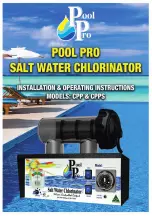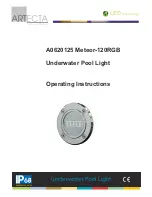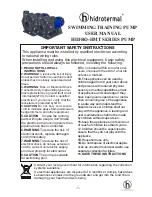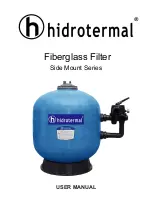
33
INSTALLATION OF UNDERWATER LIGHT
Local code must be consulted concerning electrical connections. Underwater lighting fixtures
and fixture housings must be installed under the provisions of Article 680 of the current
national Electric Code handbook. When installed with the proper niche according to Article 680,
both 12-volt and 120-volt fixtures will require additional safeguards. These safeguards include
either differential circuit protectors or GFCI ground detectors. For specific underwater light
installation instructions, please refer to your individual manufacturer's instructions.
For niche lights, the precut/molded light hole in the
wall panel must be installed so that the light will be
located near the bottom of the pool. Once again,
before installing the liner, install the niche with
gaskets in the wall panel with the holding screws.
Insert 4 faceplate screws into the niche, without
faceplate. This will help locate screw holes after
the installation of the liner.
For additional information on niche lighting, visit
http://www.royalswimmingpools.com/blog/how-to-install-an-inground-pool-light-and-niche/
Inlet lights, such as the most common Hayward 320’s, are installed like a return inlet fitting
.
Your pool configuration will determine the locations of your inlet lights. You will need a hole
saw to cut into the wall panels for the location of each inlet light. These lights can be installed
almost anywhere in your pool, however keep in mind that most lights require a minimum of 4”
of water above them.
TIP
Niched lights are water cooled which means that water
will
get into the housing. On the
back of the niche is a conduit tail that will need to be
water tight
, until the conduit is above
water level to prevent your pool from leaking.
TIP
The higher your lights are on your pool wall, the brighter they will appear on the surface of
your pool. It is recommended to have higher placed lights directed away from the main
seating area around your pool in order to avoid an uncomfortable amount of light shining in
that direction.
IMPORTANT! In order to replace your
niche light in the future as needed,
make sure to leave 3’
-
4’ of excess cord
inside the light housing. This will allow
you to pull the light up onto the deck
instead of having to drain your pool in
order to reach the light.
















































